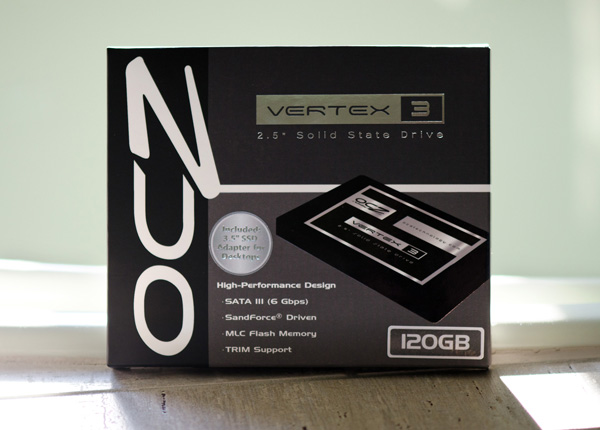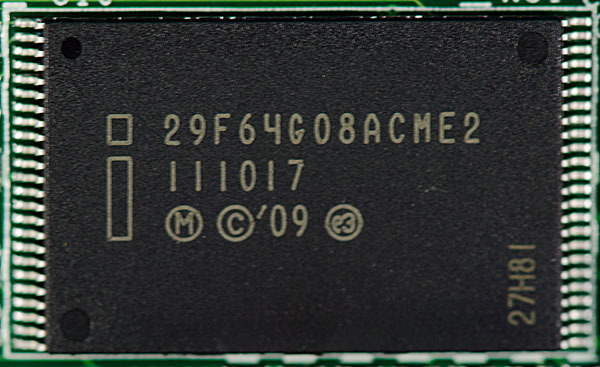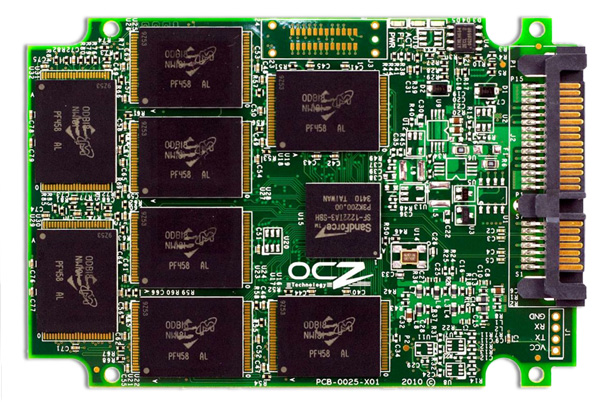The OCZ Vertex 3 Review (120GB)
by Anand Lal Shimpi on April 6, 2011 6:32 PM ESTSandForce was first to announce and preview its 2011 SSD controller technology. We first talked about the controller late last year, got a sneak peak at its performance this year at CES and then just a couple of months ago brought you a performance preview based on pre-production hardware and firmware from OCZ. Although the Vertex 3 shipment target was originally scheduled for March, thanks to a lot of testing and four new firmware revisions since I previewed the drive, the officially release got pushed back to April.
What I have in my hands is retail 120GB Vertex 3 with what OCZ is calling its final, production worthy client firmware. The Vertex 3 Pro has been pushed back a bit as the controller/firmware still have to make it through more testing and validation.
I'll get to the 120GB Vertex 3 and how its performance differs from the 240GB drive we previewed not too long ago, but first there are a few somewhat-related issues I have to get off my chest.
The Spectek Issue
Last month I wrote that OCZ had grown up after announcing the acquisition of Indilinx, a SSD controller manufacturer that was quite popular in 2009. The Indilinx deal has now officially closed and OCZ is the proud owner of the controller company for a relatively paltry $32M in OCZ stock.
The Indilinx acquisition doesn't mean much for OCZ today, however in the long run it should give OCZ at least a fighting chance at being a player in the SSD space. Keep in mind that OCZ is now fighting a battle on two fronts. Above OCZ in the chain are companies like Intel, Micron and Samsung. These are all companies with their own foundries and either produce the NAND that goes into their SSDs or the controllers as well. Below OCZ are companies like Corsair, G.Skill, Patriot and OWC. These are more of OCZ's traditional competitors, mostly acting as assembly houses or just rebadging OEM drives (Corsair is a recent exception as it has its own firmware/controller combination with the P3 series).
By acquiring Indilinx OCZ takes one more step up the ladder towards the Intel/Micron/Samsung group. Unfortunately at that level, there's a new problem: NAND supply.
NAND Flash is not unlike any other commodity. Its price is subject to variation based on a myriad of factors. If you control the fabs, then you generally have a good idea of what's coming. There's still a great deal of volatility even for a fab owner, process technologies are very difficult to roll out and there is always the risk of issues in manufacturing, but generally speaking you've got a better chance of supply and controlled costs if you're making the NAND. If you don't control the fabs, you're at their mercy. While buying Indilinx gave OCZ the ability to be independent of any controller maker if it wanted to, OCZ is still at the mercy of the NAND manufacturers.
Currently OCZ ships drives with NAND from four different companies: Intel, Micron, Spectek and Hynix. The Intel and Micron stuff is available in both 34nm and 25nm flavors, Spectek is strictly 34nm and Hynix is 32nm.
Each NAND supplier has its own list of parts with their own list of specifications. While they're generally comparable in terms of reliability and performance, there is some variance not just on the NAND side but how controllers interact with the aforementioned NAND.
Approximately 90% of what OCZ ships in the Vertex 2 and 3 is using Intel or Micron NAND. Those two tend to be the most interchangeable as they physically come from the same plant. Intel/Micron have also been on the forefront of driving new process technologies so it makes sense to ship as much of that stuff as you can given the promise of lower costs.
Last month OWC published a blog accusing OCZ of shipping inferior NAND on the Vertex 2. OWC requested a drive from OCZ and it was built using 34nm Spectek NAND. Spectek, for those of you who aren't familiar, is a subsidiary of Micron (much like Crucial is a subsidiary of Micron). IMFT manufactures the NAND, the Micron side of it takes and packages it - some of it is used or sold by Micron, some of it is "sold" to Crucial and some of it is "sold" to Spectek. Only Spectek adds its own branding to the NAND.
OWC published this photo of the NAND used in their Vertex 2 sample:
I don't know the cause of the bad blood between OWC and OCZ nor do I believe it's relevant. What I do know is the following:
The 34nm Spectek parts pictured above are rated at 3000 program/erase cycles. I've already established that 3000 cycles is more than enough for a desktop workload with a reasonably smart controller. Given the extremely low write amplification I've measured on SandForce drives, I don't believe 3000 cycles is an issue. It's also worth noting that 3000 cycles is at the lower end for what's industry standard for 25nm/34nm NAND. Micron branded parts are also rated at 3000 cycles, however I've heard that's a conservative rating.
If you order NAND from Spectek you'll know that the -AL on the part number is the highest grade that Spectek sells; it stands for "Full spec w/ tighter requirements". I don't know what Spectek's testing or validation methodology are but the NAND pictured above is the highest grade Spectek sells and it's rated at 3000 p/e cycles. This is the same quantity of information I know about Intel NAND and Micron NAND. It's quite possible that the Spectek branded stuff is somehow worse, I just don't have any information that shows me it is.
OCZ insists that there's no difference between the Spectek stuff and standard Micron 34nm NAND. Given that the NAND comes out of the same fab and carries the same p/e rating, the story is plausible. Unless OWC has done some specific testing on this NAND to show that it's unfit for use in an SSD, I'm going to call this myth busted.













153 Comments
View All Comments
SolidSteel144 - Wednesday, April 6, 2011 - link
Why weren't other controllers tested?AMD's SB850 should also be able to handle these drives at full speed.
A5 - Wednesday, April 6, 2011 - link
If you go back and look at the Sandy Bridge launch article (http://www.anandtech.com/show/4083/the-sandy-bridg... you'll see that the Intel and AMD controllers have essentially identical performance. No reason to double his benchmark time for a 1% difference.acripps - Wednesday, April 6, 2011 - link
Newegg should have one to my door tomorrow......The last drop of my yule spending authorization. It will spend the next few years drifting through various machine incarnations....till it passes out of the pool in a give-away pc....somewhere around 2014.watzupken - Wednesday, April 6, 2011 - link
Following this issue I had with them, there won't be another OCZ product from me. Anand did point out a good thing that this issue is far from over since OCZ left buyers like myself and others out in the cold in the exchange. So other than the 60 and 120GB drives, no other drives are eligible for an exchange. Worst case, I got the affected drive back due to an exchange as the earlier drive failed. I return fast drive, get a slow drive back. How nice.devlabz - Wednesday, April 6, 2011 - link
Last few articles I ended up wondering why random read speed in SF controllers is slower than random write. I may have missed some important article explaining all that stuff, tho i read all of them. Isn't flash technology favoring the read speeds? Or it have something to do with lookups for the random data chunks?Most likely this will be the year where I'll try to get a SSD drive, and since my main reason will be to reduce the compilation times of my projects and I think that my biggest gain will be with highest random read IOPs drive? Am I wrong here? Or will it matter that much actually?
FunBunny2 - Wednesday, April 6, 2011 - link
I've read, don't remember where, that the IMFT 25nm NAND has on-die ECC circuitry. So:- did you find such
- is OCZ, or anyone, exercising it
???
Movieman420 - Wednesday, April 6, 2011 - link
Yeah...Tosh also just introduced their 'built-in ECC' nand.http://www.techpowerup.com/143619/Toshiba-Debuts-S...
The thing is, from what I understand anyway, that this nand will take the ECC burden off the controller. Thing is tho that SandForce controllers actually accell at ECC duties vs other controllers. This is a major selling point because as the die process continues to shrink, the ECC burden will continue to increase. So I guess I'm saying that I'm not too sure that more expensive ecc-nand would be practical if the controller doesn't suffer from the increasing ECC issue. Someone with more knowledge about how the SF controller works could probably answer the question best...cough*Anand*cough. ;)
Movieman420 - Wednesday, April 6, 2011 - link
The dismal performance of the Hynix nand was news to me. It does however explain why there were many users with horrid performance posting on the Ocz forums. I suspect these were the ones who where told that the problem was with their PC/Lappy. It has never once been mentioned on the forum that some drives may have low performing nand inside. No wonder they kept reminding folks not to open their drives 'due to potential warranty issues'. It seems Ocz was being less than forthcoming even before the whole 25nm nand thing blew up. I really really REALLY hope that Ocz puts an end to the shady business we've seem for the last few months...they are a great company with a great product. Omission and/or deception isn't gonna fly, especially when you cater to enthusiasts who are not exactly stupid. It's those same 'enthusiasts' who made Ocz's early success possible in the first place. I know that things have since changed and now the vast majority of their sales are to commercial and enterprise customers. They'd never think of pulling this with those customers, but they'll do it to the very people who made their early success possible in the first place? This post and my previous one come from the prospective of a die hard customer who also happens to be an Ocz shareholder as well. Just wish I could afford enough to actually have a say so in the way things go down. :Pxboxist - Wednesday, April 6, 2011 - link
Anand,I'm a very casual hardware enthusiast, and admittedly most of the technical aspects discussed in this article eludes me.
With that said, I don't need to understand everything to continue to be impressed by your enthusiasm for the products in your industry, and the way you carry yourself as an ambassador for all of your users. The way you went after OCZ here has to be applauded.
fixxxer0 - Wednesday, April 6, 2011 - link
after being disappointed in some way with just about every (large) company i've dealt with, whether it be insurance, auto makers, electronics, appliances, you name it... i am glad to see one finally accepting responsibility, and doing the right thing.i do not expect 100% perfection from every company at all times. i know sometime things are DOA, or defective, or flawed. but to actually have a company take that extra step and make it right without you having to sue them is commendable.
personally, when it comes time on deciding which drive to go with, it will mainly be on the numbers, but OCZ's ethics will definitely give them the edge if there is a toss up.